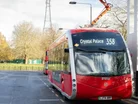TfL's Electric Buses Propel London Toward Net Zero by 2030

Transport for London (TfL) has unveiled a pioneering step toward sustainable urban mobility with the launch of tram-like electric buses on the 358 route. The initiative forms part of London's ambition to achieve net zero carbon emissions by 2030, aligning with the city's commitment to green transport solutions.
Zero-emission technology on the 358 route
The newly introduced electric buses are powered by innovative pantograph charging technology.
Thanks to an arm-like structure mounted on the roof that connects to charging points at both ends of the route, the buses can recharge in as little as six minutes.
The rapid recharging capability ensures efficient service without extended downtime.
The fleet represents the culmination of a collaboration between TfL, Go-Ahead London, and Spanish supplier Irizar.
Mete Coban, London's Deputy Mayor for the Environment, said, "Electric bus fleets are key to the mayor's aims of cleaning up London's toxic air and making London a net-zero carbon city by 2030."
A vision for sustainable transport
London has already made significant strides in decarbonising its transport network. More than 1,700 zero-emission buses are now in service, reflecting a robust commitment to environmental sustainability. The progress aligns with Mayor Sadiq Khan's Mayor's Transport Strategy, which envisions 80% of all city trips by walking, cycling, or public transport by 2041.
The accelerated green pathway
London's ambitious 2030 net-zero goal falls under its Accelerated Green Pathway, adopted in 2022. The framework sets measurable targets, including a 27% reduction in car vehicle kilometres by the decade's end. Additionally, the city aims to achieve zero waste by 2050.
Mayor Kahn emphasised the importance of integrating sustainability into London's transport infrastructure. As part of this vision, TfL's introduction of innovative electric buses reflects a practical and scalable solution for reducing emissions while maintaining high service standards for passengers.
The cutting-edge pantograph technology in these electric buses enhances operational efficiency and reduces reliance on conventional charging methods. By enabling rapid charging directly on the route, this system eliminates the need for prolonged charging periods at depots, ensuring minimal disruption to the service.
A model for urban sustainability
Introducing these tram-like buses demonstrates how public transport can evolve to meet the twin challenges of urban growth and environmental sustainability. TfL, Go-Ahead London, and Irizar have set a benchmark for cities worldwide to follow in their pursuit of decarbonised transport systems.
"London is leading the way in sustainable transport solutions. By investing in these technologies, we're improving air quality and contributing to a global effort to combat climate change."
With its focus on innovation, efficiency, and environmental responsibility, London continues to set the standard for sustainable urban transport. The new electric buses on the 358 route represent a significant milestone in the city's journey toward net zero carbon emissions, showcasing the transformative potential of technology in shaping the future of mobility.
As the city progresses toward its 2030 goals, initiatives like this serve as a testament to the power of collaboration and forward-thinking policy in creating cleaner, greener urban spaces.
Explore the latest edition of EV Magazine and be part of the conversation at our global conference series, Sustainability LIVE and Manufacturing LIVE.
Discover all our upcoming events and secure your tickets today.
EV Magazine is a BizClik brand
- JLR Upskills 20,000+ to Drive EV Diversity and InnovationSustainability
- Hybrid Airlander 10 to Transform Highlands Air TransportSustainability
- E-Boats Transform Marine Sustainability in NZ & AustraliaMobility
- Disruption as Opportunity: Transforming the Automotive IndusCharging & Infrastructure


